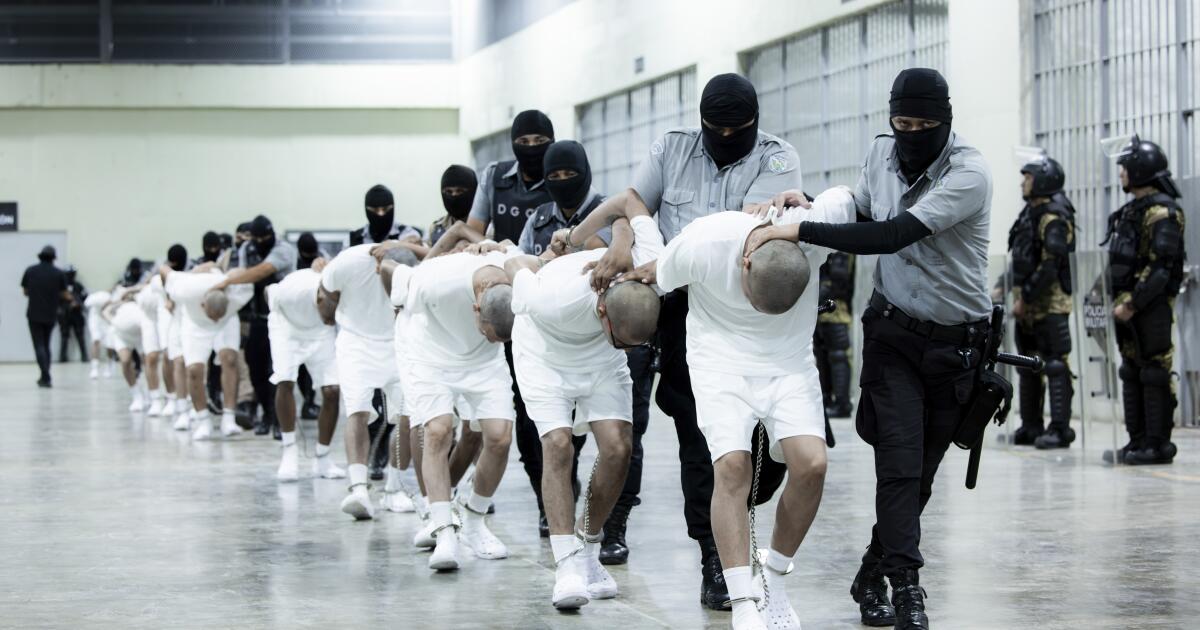The U.S. Supreme Court temporarily blocked the removal of Venezuelan detainees accused under a wartime law of being foreign gang members early Saturday morning, after the ACLU argued the men were at risk of imminent removal to an El Salvadoran prison.
“The Government is directed not to remove any member of the putative class of detainees from the United States until further order of this Court,” the court stated in an unsigned order.
Justices Clarence Thomas and Samuel Alito dissented.
The court’s after-midnight intervention heightens its clash with the Trump administration over deportations. It suggests most of the justices are not willing to trust Trump officials to follow its earlier order giving detainees a right to a hearing before they can be deported.
The ACLU had asked multiple courts on Friday to temporarily halt the detainees’ removal — arguing in one filing that the Trump administration was busing many of them presumably to an airport to be deported.
In a Friday hearing, Drew C. Ensign, a lawyer for the U.S. Department of Justice, told U.S. District Judge James E. Boasberg in Washington, D.C., that there were no current plans to deport individuals Friday or Saturday by plane presumably to El Salvador, but the Trump administration reserved the right to remove people on Saturday.
The ACLU asked the courts for an emergency order after Venezuelan detainees from across the country, including California, were transferred to the Bluebonnet Detention Facility in Anson, Texas, and, according to their filings, told they will be removed as soon as Friday night.
The Trump administration flew hundreds of Venezuelan immigrants deemed members of Tren de Aragua last month to El Salvador, where they are being held in a notorious mega-prison called the Terrorism Confinement Center. Families of many of the men sent to El Salvador on the earlier planes say they are not gang members.
The deportations kicked off a high-stakes legal battle testing the limits of President Trump’s deportation plans and his power.
The Supreme Court ruled earlier this month that the wartime authority invoked by the administration could resume, but immigrants must be given proper notice and a chance to make their case in places where they were being detained.
Boasberg, who had heard the earlier case about the administration’s invocation of the Alien Enemies Act of 1798, had ordered a temporary halt to removals. But despite the order, deportation planes were sent to El Salvador, where more than 200 people remain in prison.
The Trump administration has said that once individuals are outside of U.S. jurisdiction, there is little they can do to bring them back to the United States.
Recently, Trump and his top advisors met in the Oval Office with Salvadoran President Nayib Bukele and were almost gleeful in saying that nothing could be done to return any of those prisoners once they had left this country.
The court had said the administration had a duty to “facilitate” the return of Kilmar Abrego Garcia, who was deported in error to El Salvador.
“If these people are removed to a foreign prison, perhaps for the rest of their lives, without any due process, it would be in clear violation of the Supreme Court’s opinion,” Lee Gelernt, ACLU attorney leading the case, told The Times on Friday.
The case began in a Texas federal court earlier in the week, when the ACLU asked Judge Wesley Hendrix to temporarily stop any removal on behalf of two individuals because they didn’t have a chance to challenge their cases.
Hendrix denied the request. By Friday, lawyers learned of more individuals being held and asked again, after reports circulated that removals were imminent. When lawyers didn’t get a response that afternoon, they sought help from the U.S. Court of Appeals for the 5th District and asked the Supreme Court to step in.
Alito is the circuit justice for the 5th Circuit, which means that emergency appeals go to him first if they come from Texas, Louisiana or Mississippi. But apparently, he was not willing to move quickly to block further deportations.
That means Chief Justice John G. Roberts and six other justices put together the order without Alito or Thomas.
ACLU lawyers argued that the move was necessary because officials at Bluebonnet told detainees they will be deported and asked them to sign notices of removal in English based on their alleged affiliation with Tren de Aragua.
One man at the facility sent his wife a TikTok video depicting various detainees, according to a declaration submitted by ACLU lawyers from Michelle Brané, executive director of a nonprofit that provides services for asylum seekers. In it, one young man says they are all being labeled as members of Tren de Aragua. They aren’t allowed to call their families, and the detainees don’t know where they will be removed to, he says in the video.
“They’re saying we have to be removed, quickly, because we are a terrorist threat to the country,” he says.
Another detainee says they were given a paper to sign but were told that, whether they signed or not, they would be removed from the country.
A third detainee says, “We are not members of Tren de Aragua. We are normal, civil people.” A fourth says, “I don’t have a deportation order. I have all my paperwork in order. I have my American children here,” he says. “I was arrested with no arrest warrant and they want me deported.”

